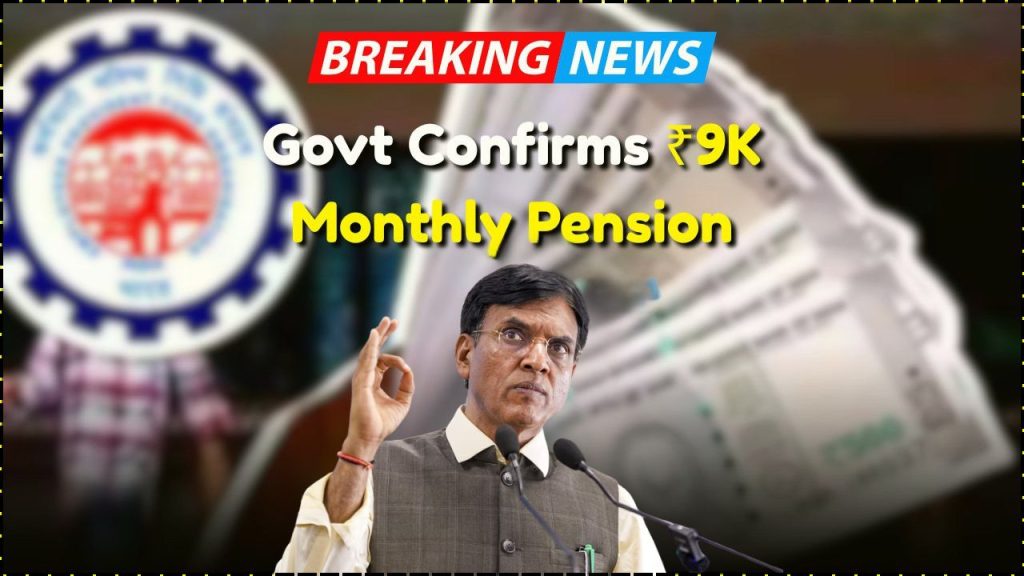
In a landmark move to redefine retirement benefits for private sector workers, the Employees’ Provident Fund Organisation (EPFO) has announced a new monthly pension plan of ₹9,000. This initiative, designed to focus on financial security post-retirement, is aimed at private sector employees who often face uncertainty after their working years.
This pension plan is a part of the government’s wider strategy to promote social welfare and economic stability for aging workers in the non-government workforce.
Overview of the ₹9,000 Monthly Pension Plan
EPFO’s newly launched pension scheme aims to strengthen the financial independence of private sector employees after retirement. With a fixed monthly pension of ₹9,000, the plan provides a reliable income source for millions of retirees.
✦ The pension scheme is contributory, with inputs from both employers and employees.
✦ It offers inflation-adjusted payouts to maintain real value over time.
✦ It aims to cover a broad base of private sector workers, especially those enrolled with EPFO.
✦ Provisions for nominee/spouse benefits ensure continued support to the family.
The objective is to make retirement planning more inclusive, predictable, and aligned with modern economic realities.
Key Features of the Pension Scheme
This pension plan offers several attractive and forward-looking features that make it one of the most promising options for private employees in India.
| Feature | Description |
|---|---|
| Monthly Pension | Fixed payout of ₹9,000 |
| Contribution Type | Joint (Employee + Employer) |
| Inflation Protection | Periodic revision of payout |
| Eligibility | Registered EPFO private sector employees |
| Digital Enrollment | Easy access through EPFO’s online portal |
| Family Security | Nominee or spouse gets continued benefits |
| Additional Perks | Includes healthcare, skill training & discounts |
These features are specifically designed to provide not only financial relief but also holistic support for aging employees.
How the Pension Plan Works?
This scheme is a contributory pension plan, which means both the employer and the employee are required to contribute during the employment phase. Here’s a brief overview of its working model:
- Contribution Phase: Active during employment, both the employee and the employer make regular deposits into the pension fund.
- Accumulation: Contributions are pooled into a corpus under EPFO management.
- Payout Phase: Upon retirement, the employee receives a guaranteed monthly pension of ₹9,000.
- Post-Retirement Adjustments: Pension amounts are reviewed periodically to factor in inflation.
Eligibility Criteria and Enrollment Process
Who Can Apply?
To avail of the benefits of the ₹9,000 pension plan, individuals must meet the following conditions:
| Criteria | Requirement |
|---|---|
| EPFO Membership | Must be a registered EPFO member |
| Sector | Applicable to private sector workers |
| Contribution Record | Must have consistent contributions during working years |
| Enrollment Period | Must enroll before retirement |
| Minimum Age for Pension | As per EPFO retirement rules (usually 58 years) |
How to Enroll?
Enrollment is a straightforward process and can be completed digitally:
- Visit the official http://EPFO website.
- Log in using UAN (Universal Account Number) and password.
- Navigate to the ‘Pension Enrollment’ section.
- Upload necessary documents like PAN, Aadhaar, salary slips, etc.
- Submit and track application status online.
This simplified system aims to bring more workers under the pension safety net without cumbersome paperwork.
Additional Benefits Beyond ₹9,000 Pension
While the ₹9,000 monthly pension is the core of the scheme, EPFO also offers value-added benefits for pensioners that go beyond financial support:
| Benefit Type | Details |
|---|---|
| Healthcare Coverage | Access to select medical services and insurance |
| Skill Development | Training and part-time work opportunities for retirees |
| Product & Service Discounts | Special offers for pensioners on travel, shopping, and more |
| Financial Literacy Programs | Workshops to educate pensioners about investment, tax, and savings |
These features reflect a shift from mere financial support to holistic retirement care.
Comparative Table of Major Pension Schemes
To understand where this plan stands, here’s a side-by-side comparison with other popular pension schemes in India:
| Pension Scheme | Monthly Payout | Target Group |
|---|---|---|
| EPFO ₹9,000 Pension Plan | ₹9,000 | Private Sector Employees |
| Atal Pension Yojana (APY) | ₹1,000 – ₹5,000 | Workers in the Unorganised Sector |
| National Pension Scheme (NPS) | Variable (market-linked) | Government & Private Sector |
| Pradhan Mantri Vaya Vandana Yojana | Up to ₹10,000 | Senior Citizens |
| Indira Gandhi National Old Age Pension | ₹200 – ₹500 | BPL Senior Citizens |
| Employees’ Pension Scheme (EPS-95) | Variable | EPFO Members |
| Varishtha Pension Bima Yojana | ₹5,000 | Senior Citizens |
The EPFO ₹9,000 plan offers one of the highest fixed pensions under a government-backed contributory model.
Steps to Avail ₹9,000 Pension Plan
To avail of this pension scheme, here’s a step-by-step checklist:
- Ensure EPFO Registration: Verify that you are an active EPFO member.
- Consistent Contributions: Ensure regular contributions through your employer.
- Enroll Before Retirement: Initiate enrollment while still employed.
- Use EPFO Portal: Register through https://www.epfindia.gov.in
- Document Submission: Upload PAN, Aadhaar, proof of employment, and bank details.
- Keep Track: Stay updated with scheme enhancements or policy changes.
It is advisable to start planning early to get the maximum benefits under this scheme.
Frequently Asked Questions (FAQs)
1. Who can apply for the ₹9,000 pension plan?
Private sector workers who are registered EPFO members and have contributed regularly.
2. Can I apply for the pension after retiring?
No, the enrollment must be completed during the working years.
3. Is there any government subsidy involved in the pension?
The plan is jointly funded by the employer and the employee, without a direct government contribution.
4. Will my family receive pension benefits after my death?
Yes, nominee or spouse benefits are included under the scheme’s provisions.

Katherine Johnson is a passionate writer with a keen interest in storytelling, content creation, and creative expression. She enjoys exploring diverse topics and crafting engaging narratives that captivate readers.



